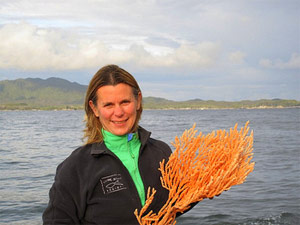
While Vancouver and national media are expressing shock and horror about this month's collapse of the Fraser River sockeye run, an organization up the coast is quietly working to prevent future disasters like this one.
Based in an old house on the main street of Sointula, on Malcolm Island, the Living Oceans Society is promoting an ambitious, made-in-B.C. solution to the problems that beset our coastal waters.
LOS is the creation of its executive director Jennifer Lash, who has been working since 1992 on ocean conservation in British Columbia. In an interview with the Tyee, Lash said that when she arrived here in 1992, most environmental groups were concerned with land issues, especially trees. As a result, she founded LOS in 1998.
In its early years, the society lobbied for 'no-take' marine refuges, but its goals and ambitions have evolved since then. LOS has four major programs: marine protected areas, energy, aquaculture and sustainable fisheries. All of them are involved in promoting a project covering 88,000 square kilometers of coastal and offshore waters: the Pacific North Coast Integrated Management Area.
PNCIMA (pronounced pin-SEE-ma) started in 2002 as a federal Ocean Strategy that called for an integrated management area for the coast. "But 'integrated management' wasn't defined," Lash says. "So it was an opportunity for us to develop a made-in-B.C. solution."
Integrated management now means, in effect, that the people living in the region should decide what happens to it -- whether oil tankers can travel the coast, whether offshore oil and gas drilling will be allowed, how fish farms should operate, and how other industries can prosper within the ecosystem.
Where science and politics meet
Recently, says Lash, the process has made "huge steps." The Department of Fisheries and Oceans and the local First Nations signed an agreement in December 2008. At the first PNCIMA Forum, held in Richmond in March, 300 stakeholders committed to the concept. "The stakeholder engagement process is next," Lash says. This will include community-level meetings and the development of a marine transportation working group.
By the time of the next forum, in the fall of 2010, PNCIMA should have built up a considerable infrastructure of involved and informed coastal communities.
Meanwhile, the Living Oceans Society is active both politically and scientifically. LOS works with a number of other organizations in the Coastal Alliance for Aquaculture Reform. It's also joined the International Union for Conservation of Nature, and endorses programs like SeaChoice, which promotes sustainable seafood production.
New findings on health of coral
In doing its own science, LOS has also made news. In June, the Finding Coral Expedition surveyed the coast by submersible, looking for sites that need to be protected from trawling.
"We're gaining a growing awareness of the role of corals in the health of the ocean," Lash says. "Trawling produces coral as a by-catch. Cold-water corals need to be protected. Change wasn't coming fast enough, so we chose to do the research ourselves."
The expedition returned with good data, she says, and saw some "truly spectacular" sites. It also found some trawl tracks -- areas where the sea bottom was visibly changed.
Fighting for whales and against a fish farm
Armed with such information, the communities and industries in PNCIMA should be able to make wise long-term decisions based on an understanding of the region's ecosystem. "By 2010 we'll have made a start on developing a planning process," Lash says. "By 2012 the process should be established."
In the meantime, Lash and the LOS are working to stop the Gunner Point fish farm, suing to prevent seismic testing that threatens whales, and lobbying against a tar sands pipeline that will put a tanker port on the north coast.
Will LOS get involved in other, land-based environmental issues? Lash says no: "Our commitment runs to the high-tide line." ![]()
Read more: Politics, Science + Tech, Environment















Tyee Commenting Guidelines
Comments that violate guidelines risk being deleted, and violations may result in a temporary or permanent user ban. Maintain the spirit of good conversation to stay in the discussion.
*Please note The Tyee is not a forum for spreading misinformation about COVID-19, denying its existence or minimizing its risk to public health.
Do:
Do not: